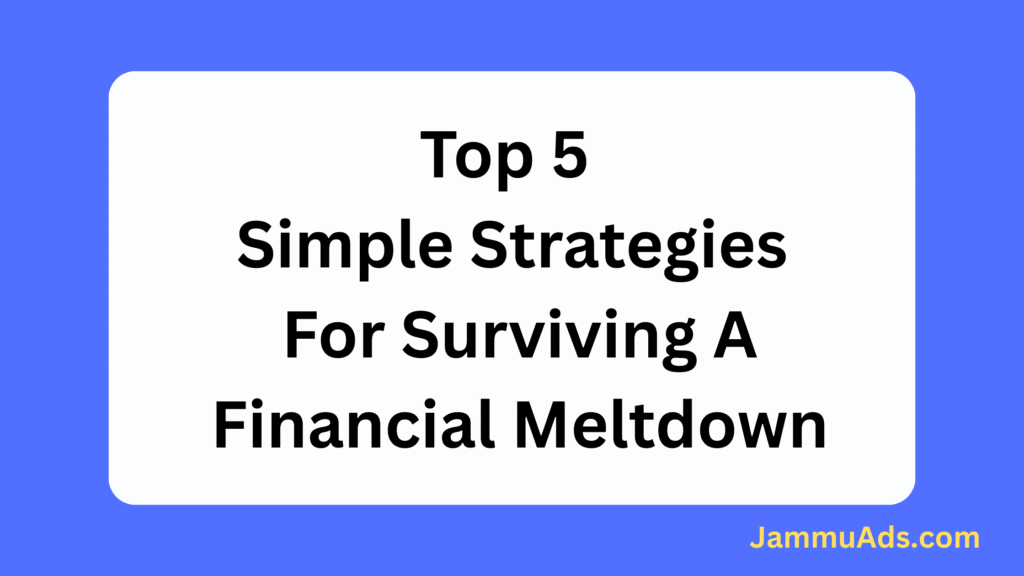Every cent that you’ve accumulated has come from years of hard work and sacrifice.This money is the result of waking up early, putting in long hours, skipping certain luxuries, and making countless small choices to save instead of spend. It’s more than just numbers in a bank account — it represents your time, energy, and effort.
And you need to protect it because losing it would mean losing the security and comfort you’ve built over the years.
Thankfully, you can take steps to ensure that your money remains safe and sound no matter what’s going on in the financial realm. That’s right.
According to the experts, you can protect the fruits of your labor by following their sage advice And that which comes from years of studying markets and helping people avoid costly mistakes.
Top 5 Simple Strategies for Surviving a Financial Meltdown

1. Don’t Gamble With Food Money
An important rule to adhere to when investing is never invest money that you cannot afford to lose. In fact, Investopedia recommends that you should not invest in equity if you do not have invest horizon of five years but preferably more. This long-term view gives your investments time to recover from short-term ups and downs.
Never invest the food funds because food is more necessary than your so called profit. And, if you are relying on that money for retirement, make sure you choose investment instruments that focus on protecting your principle over yielding high returns. Safety first may sound boring, but in money matters, boring often means secure and stress-free.
2. Don’t Freak Out
When a financial crisis hits and your stocks take a rapid nosedive, it is important to remain calm.
Do not make a panic call by selling all the stocks at once but stay calm and see if it gets up. Those who waited are always got profit than those who panicked and sold stocks.
If you’ve given yourself the recommended five-year investment horizon, you will be able to ride out these market meltdowns–recovering your initial investment and walking away with a tidy profit.
Remember, the stock market has always had ups and downs, but patience and discipline usually win in the end.
3. Don’t Scoff at the Savings Account
While they may seem old school and not nearly as “fun” as watching the Dow, there is much to be said for keeping your nest egg safe in a savings account.
Plus, as US News & World Report adds, many are insured by the FDIC for up to $250,000. And, to add to their appeal, many financial institutions also offer high-yield savings accounts that provide both the peace of mind of a bank account and a better-than-average return.
These accounts are easy to open, require little effort to manage, and can serve as a perfect place to park your emergency cash.
4. Don’t Forget to Diversify
The experts agree–a sure-fire way to weather a financial downturn is to diversify your financial investments. As Fidelity Investments advises, you should look for assets whose returns haven’t historically moved in the same direction, so that if a portion of your portfolio is declining, the rest is, hopefully, growing.
And, remember to adjust the way your portfolio is divided as you draw nearer to retirement by opting for safer investment tools.
For example, you might start with more stocks in your younger years, then slowly shift to bonds, savings, and other low-risk options as you approach retirement age.
5. Don’t Forget an Emergency Fund
With all this talk of investing and “growing your money,” it may be easy to overlook another important financial goal–creating a financial cushion.
In fact, MarketWatch recommends that retirees have at least two years of their cost of living in cash. That extra money will serve as an insurance policy against a financial meltdown, enabling them to live off cash reserves while waiting for their investments to recover.
Having this fund also reduces stress, because you know you can cover your bills without dipping into your long-term savings
A financial meltdown does not have to amount to a personal catastrophe. By taking measures to protect your money, you can sail through an economic downturn with your savings intact and your future secure.
The goal isn’t just to survive — it’s to be prepared enough to face any challenge with confidence. After all, your money is more than just paper or numbers; it’s your life’s work, and it deserves the best protection you can give it.
Conclusion
Money is not just numbers in a bank account. It’s the early mornings you got up for work, the long hours you put in, and the little sacrifices you made along the way. That’s why protecting it isn’t something to think about later — it’s something to do now.
By following these common-sense steps — keeping your daily living money safe, staying calm when the market dips, using secure places like savings accounts, spreading your investments, and keeping a cash cushion — you give yourself a solid safety net.
In the end, it’s not about getting rich quick. It’s about making sure what you’ve built with so much effort stays with you. When your money is safe, your mind is at ease, and you can face the future without fear, no matter how the economy is doing.
